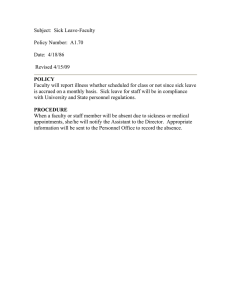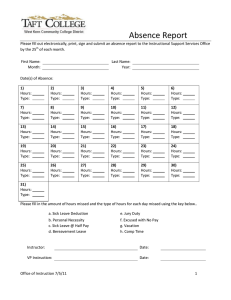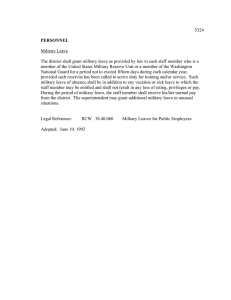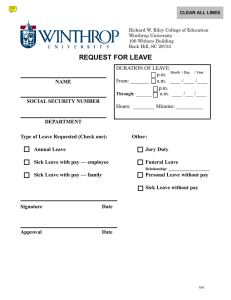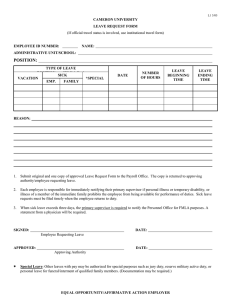of MANUAL OF ADMINISTRATIVE POLICIES AND PROCEDURES SECTION: Human
advertisement
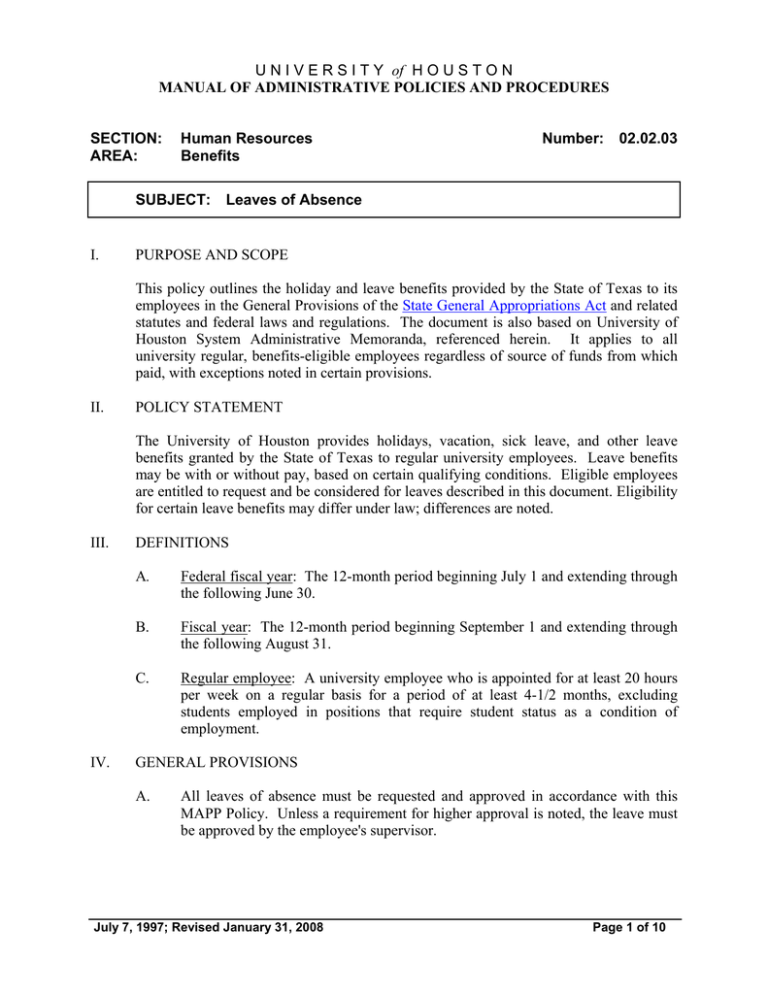
U N I V E R S I T Y of H O U S T O N MANUAL OF ADMINISTRATIVE POLICIES AND PROCEDURES SECTION: AREA: Human Resources Benefits SUBJECT: I. Number: 02.02.03 Leaves of Absence PURPOSE AND SCOPE This policy outlines the holiday and leave benefits provided by the State of Texas to its employees in the General Provisions of the State General Appropriations Act and related statutes and federal laws and regulations. The document is also based on University of Houston System Administrative Memoranda, referenced herein. It applies to all university regular, benefits-eligible employees regardless of source of funds from which paid, with exceptions noted in certain provisions. II. POLICY STATEMENT The University of Houston provides holidays, vacation, sick leave, and other leave benefits granted by the State of Texas to regular university employees. Leave benefits may be with or without pay, based on certain qualifying conditions. Eligible employees are entitled to request and be considered for leaves described in this document. Eligibility for certain leave benefits may differ under law; differences are noted. III. IV. DEFINITIONS A. Federal fiscal year: The 12-month period beginning July 1 and extending through the following June 30. B. Fiscal year: The 12-month period beginning September 1 and extending through the following August 31. C. Regular employee: A university employee who is appointed for at least 20 hours per week on a regular basis for a period of at least 4-1/2 months, excluding students employed in positions that require student status as a condition of employment. GENERAL PROVISIONS A. All leaves of absence must be requested and approved in accordance with this MAPP Policy. Unless a requirement for higher approval is noted, the leave must be approved by the employee's supervisor. July 7, 1997; Revised January 31, 2008 Page 1 of 10 Leaves of Absence V. MAPP 02.02.03 B. One leave period may involve several types of leave; i.e., sick leave, family and medical leave, extended sick leave, vacation, etc. In such cases, each type of leave involved must be requested according to the procedure for that leave and reported accordingly. C. The date of return to work shall be specified when the leave is requested; or, if the return date is not known, the employee must contact the supervisor regularly, in accordance with the supervisor's directions. D. The employee must report to the supervisor if he/she will be unable to return to work at the end of the leave period and must provide an acceptable reason for the delay. Failure to return to work from an approved leave of absence by the intended date and to provide an acceptable reason will be considered abandonment by the employee of his/her job (MAPP 02.04.03). E. Records of leave requests and leave accrued and taken must be maintained by the department. The official leave records are those reflected in the University of Houston payroll system. Departmental records must be reconciled to payroll system records on a monthly basis. F. Time away from the workplace on the university's behalf and/or approved as time worked shall not be considered as leave. G. It is not necessary for a full-time, exempt employee to record an absence of less than a day due to illness or for personal reasons if the employee works at least 40 hours in that workweek. If the employee does not work 40 hours in that workweek, absences must be recorded as vacation, sick leave, or other appropriate leave, to comply with State law. REQUESTING LEAVES OF ABSENCE A. A Leave Request/Notification form (found on the Human Resources website http://www.uh.edu/hr ) must be used to request most types of leave. The form shall be completed and submitted to the employee's supervisor for approval with the required documentation attached. When a leave period involves more than one type of leave, each type of leave involved shall be requested according to the procedure for that type leave. July 7, 1997; Revised January 31, 2008 Page 2 of 10 Leaves of Absence VI. MAPP 02.02.03 LEAVES OF ABSENCE WITH PAY The following types of leave are provided to the employee at full pay, and do not affect state service credit, university benefits, or leave accruals, except where noted. A. Holidays: The state authorizes the number of annual holidays available to regular employees and provides that institutions of higher education may adjust the holiday schedule to provide the most efficient academic operation. The University of Houston holiday calendar is approved annually by the Board of Regents and includes most national holidays and an extended winter holiday break. Eligible employees who are required to work on a scheduled holiday are entitled to equivalent time off with pay to be taken during the following 12-month period. Employees may be paid for holiday compensatory time hours earned on a straight time basis when the supervisor determines that allowing the employee to take compensatory time off would be disruptive to normal teaching, research, or other critical functions. Additional details on university holiday benefits may be found in the Staff Handbook, the Faculty Handbook, and in System Administrative Memorandum 02.E.03. B. Vacation: Regular staff employees and faculty on 12-month appointments are entitled to paid vacation time in each fiscal year. Vacation entitlement is earned according to the schedule established in the biennial State General Appropriations Act, proportionate to the FTE established for the position in which the individual is employed. Faculty other than those on 12-month appointments are not eligible for vacation. Additional details on university vacation benefits may be found in the Staff Handbook and in System Administrative Memorandum 02.D.01. C. Sick leave: - Leave for medical appointments or elective procedures must be requested ahead of time and scheduled to accommodate work requirements whenever possible. When the employee is unable to work because of illness, he/she should contact his/her supervisor at the earliest practical time in accordance with departmental procedures, and the Leave Request Notification form must be submitted promptly upon return. In addition, a medical absence of more than three working days requires a written statement from the employee's health care provider indicating the cause or nature of the illness or other acceptable statement of the facts concerning the illness. July 7, 1997; Revised January 31, 2008 Page 3 of 10 Leaves of Absence MAPP 02.02.03 Sick leave is earned at the rate of eight hours for each month or fraction of a month of employment, proportionate to the FTE established for the position(s) in which employed. 1. Extended sick leave: Extended sick leave may be available to long-term employees in good standing who have become disabled and have exhausted all accrued sick leave and other leave balances. This benefit may be awarded to provide continued income from the time all accumulated paid leave has been exhausted through the end of the waiting period for long-term disability benefits to begin. 2. Sick leave pool: The sick leave pool provides a source of additional sick leave for employees who suffer a catastrophic illness or injury and have exhausted all accrued sick leave and other leave balances. All regular employees may voluntarily transfer sick leave from their accrued balances to the UH system sick leave pool and apply for benefits from the pool. Additional details on university sick leave benefits may be found in the Staff Handbook and in System Administrative Memoranda 02.D.01 and 02.D.02. D. Administrative Leave with Pay: An employee whose job performance and productivity consistently exceeds those normally expected or required by the job description of the employee may be granted Administrative Leave with Pay. It may also be granted to an employee who has successfully completed a special project of significant importance to warrant special recognition. In either case, the required job performance level must be documented in the most recent performance evaluation or by memorandum from the employee’s supervisor. Additional details may be found on Administrative Leave with Pay in MAPP 02.02.04. E. Emergency leave: Up to eight hours of leave may be requested for personal emergencies by submitting a Leave Request/Notification form. The request requires the approval of the employee’s supervisor and the department administrator. F. Bereavement Leave: Regular employees are eligible for up to 3 days of bereavement leave (up to 5 days if the deceased lived out of the area) due to a death in the employee's family. For the purpose of this provision, the employee's family is defined as the employee's spouse or the employee's spouse's parents (or stepparents), brothers, sisters (or stepbrothers or stepsisters), children (or stepchildren), grandparents, or grandchildren. The request shall be submitted to the employee's supervisor as early as possible, identifying the relationship of the deceased to the employee. Upon return from leave, the employee may be asked to furnish acceptable documentation to his/her supervisor. July 7, 1997; Revised January 31, 2008 Page 4 of 10 Leaves of Absence G. MAPP 02.02.03 Jury duty: A university employee is entitled to leave to respond to a summons for jury duty and to serve on a jury, if selected. The employee will be granted a reasonable amount of time to report for jury duty and to report to work following dismissal from jury duty. The employee shall submit the Leave Request/ Notification form, together with a copy of the jury summons, as soon as possible after receipt. Jury time shall be estimated and revised, if necessary, upon return. Employees working the evening or night shift are entitled to leave time for the assigned shift on the day(s) they have responded to and/or served on jury duty during the day shift. If an employee is required to work the evening or night shift on the day(s) of jury duty, the employee will receive additional compensation at straight time for the time worked. The employee is entitled to keep any compensation for jury service. H. Witness leave: Any university employee called to appear in his/her official capacity in any judicial action, legislative investigation, or as an expert witness on behalf of the university shall consider and report that time as time worked, not leave. They may receive no witness fees for such appearances. However, employees providing witness services on behalf of the university are entitled to paid travel expenses. A university employee who serves as a witness for any other reason than on behalf of the university is entitled to receive witness fees, but such time must be requested and approved as vacation time, compensatory leave, or leave without pay. If the employee is responding to a subpoena and accrued leave is not available, the supervisor shall be notified and must grant leave without pay. A university employee called to appear in his/her official capacity in a judicial action, a legislative investigation, or as an expert witness on behalf of the university, shall report such time as time worked. However, the employee's supervisor must be notified of the time away. I. Administrative leave: In the event of an emergency closing of the campus or a portion of the campus declared by the president or the presidential designee in accordance with MAPP 06.01.01, regular employees who leave or cannot get to the campus as a result of the condition will be granted administrative leave for the period the university is officially closed. In such circumstances, non-exempt employees who are requested by their supervisors to stay on campus or to come to campus because of the critical nature of their work will receive additional compensation at straight time for the time they work. July 7, 1997; Revised January 31, 2008 Page 5 of 10 Leaves of Absence VII. MAPP 02.02.03 J. Volunteer firefighter leave: A university employee who is a volunteer firefighter shall be granted a leave of absence not to exceed five days each fiscal year to attend training schools conducted by state agencies. The employee shall submit the Leave Request/Notification form, along with a copy of the notice of the training or meeting, as soon as possible after the notification is received. K. Foster parent leave: An employee who is a foster parent to a child under the conservatorship of the Department of Protective and Regulatory Services (DPRS) is entitled to leave of absence to attend DPRS staffing meetings regarding the child or to attend the school district's Admission, Review, and Dismissal (ARD) meetings regarding the child. L. Red Cross volunteer leave (Ready Texans Program): Any university employee who is a certified Red Cross disaster service volunteer or who is training to become a volunteer may be granted leave not to exceed 10 days each fiscal year to participate in specialized disaster relief services for the American Red Cross. Such leave must be based on a request from the American Red Cross with the approval of the Governor's Office. This leave is subject to annual limits on the pool of state employee certified disaster volunteers set by the Legislature and coordinated by the Division of Emergency Management and the Governor's Office. M. Blind employee training leave: A university employee who is blind (as defined in section 91.002(2) of the Human Resources code) is entitled to leave not to exceed 10 days per fiscal year to acquaint the employee with a seeing-eye dog to be used by the employee. N. Faculty development leave: Information on faculty development leaves may be found in the Faculty Handbook or through the Office of the Senior Vice President for Academic Affairs. O. Compensatory leave: As defined in MAPP 02.01.03, non-exempt university employees may be entitled to compensatory leave time in lieu of pay for time worked beyond the standard 40-hour workweek. Restrictions and terms differ for non-exempt FLSA and straight-time compensatory leave. LEAVES OF ABSENCE WITHOUT PAY (Unpaid Leave) A. In accordance with the terms of UH System Administrative Memorandum 02.D.03 and the UH Staff Handbook, leave of absence without pay is an authorized temporary release of a staff member from the payroll. July 7, 1997; Revised January 31, 2008 Page 6 of 10 Leaves of Absence MAPP 02.02.03 B. A regular, benefits-eligible employee may be granted a leave of absence without pay for sufficient reason for a period not to exceed 12 months. Except for disciplinary suspensions, active military duty, and workers' compensation situations, all applicable accrued paid leave balances (vacation, compensatory leave, and sick leave) must have been exhausted before the leave without pay period commences. The use of accrued sick leave is, however, restricted to those circumstances that would otherwise qualify the employee for sick leave under state law and university policies (cited in provision V.C. above). C. A leave of absence without pay implies an intent from the employee to return to work and an intent from the university to return the employee to work. Subject to fiscal constraints, the employing department is required to reinstate an employee to the former position or to one of equivalent requirements and compensation upon expiration of the leave. D. A leave of absence without pay of longer than 30 days (other than for military active duty, family and medical leave, parental leave, or workers' compensation) requires the approval of the dean or director in accordance with the companion procedure. Leaves without pay of 30 days or less may be granted with the approval of the employee's supervisor. E. The president may grant exceptions to these policy limitations for such reasons as interagency agreements or for other educational purposes. F. Except where specified otherwise, an employee will not accrue vacation, sick leave, or state service credit for any full calendar month (i.e., from the first day of a month through the last day of a month, inclusive) on leave without pay. An employee will accrue these credits if any part of a month is paid. Also, no retirement plan contributions are made by the university while the employee is on leave without pay. Employees may continue group insurance while on leave without pay by making arrangements with the Benefits section of the Human Resources Department to personally pay the total amount of the premium, including what would have been the state's contribution. When on family and medical leave, the state's contribution will be continued, but the employee share of the premium must be paid personally by the employee. G. While on leave without pay, the employee is not eligible for holiday pay. H. The Faculty Handbook and/or the office of the Senior Vice President for Academic Affairs should be consulted for special restrictions relating to faculty leaves without pay. July 7, 1997; Revised January 31, 2008 Page 7 of 10 Leaves of Absence VIII. MAPP 02.02.03 LEAVES THAT MAY BE PAID OR UNPAID A. Workers' compensation leave: All university employees are covered under provisions of the Texas Workers' Compensation Act. Under this act, if an employee is injured on the job or sustains a job-related illness and the employee's claim is accepted for workers' compensation benefits, the employee is eligible for workers' compensation leave. When on workers' compensation leave, the employee may elect to take accrued paid sick leave, vacation, and/or compensatory time; or the employee may take leave without pay from the university, during which the employee is compensated at a percentage of his/her salary by the State of Texas Attorney General's Office. In either case, the State of Texas covers medical costs. Also, in any case, the injury or illness must be reported to the employee's supervisor immediately. Forms used for reporting job-related injury or illness for eligibility for compensation under the Workers' Compensation Act are described in MAPP 06.05.01 and may be obtained from the Environmental Health and Risk Management Department. If the leave involves leave without pay, a personnel action request (PAR) shall be submitted, indicating the reason for the leave. B. Family and medical leave: As detailed in MAPP 02.02.01, an eligible employee is entitled to a maximum of 12 weeks of family and medical leave in a year (as defined) for the following events or conditions: • • • • The birth of a child and the care of the newborn The placement of a child with an employee in connection with the adoption or state-approved foster care of the child The serious health condition of a child, parent, or spouse of the employee A serious health condition of the employee The employee taking family and medical leave must use all applicable accrued paid leave balances (including accrued sick leave and vacation, but not compensatory leave) unless concurrently on workers' compensation. The use of accrued sick leave is restricted to those circumstances that would otherwise qualify for sick leave usage under state law and University sick leave policy (MAPP 02.02.02). If paid leave balances are exhausted, the remainder of the 12 weeks of family and medical leave will be on leave without pay. The Leave Request/ Notification form shall be submitted, along with the Application for Family or Medical Leave form and the health care provider's certification, in accordance with MAPP 02.02.01. When the request involves leave without pay, a Personnel Action Request (PAR) shall be submitted, indicating the reason for the leave. July 7, 1997; Revised January 31, 2008 Page 8 of 10 Leaves of Absence C. MAPP 02.02.03 Parental leave: Under MAPP 02.02.02, an employee who is not eligible for family and medical leave is entitled to a maximum of 12 weeks of parental leave for the following events: • • The birth of a child to the employee and the care of the newborn. The placement of a child under three years of age with an employee in connection with the adoption or state-approved foster care of the child. The employee taking parental leave must use all applicable accrued paid leave balances (including accrued sick leave, vacation, and compensatory leave). The use of accrued sick leave is restricted to those circumstances that would otherwise qualify for sick leave usage under state law and University sick leave policy (MAPP 02.02.02). If paid leave balances are exhausted, the remainder of the 12 weeks of family and medical leave will be on leave without pay. D. Military leave: Under the General Provisions of the General Appropriations Act, the State Government Code, and UH System Administrative Memorandum 02.D.05, University of Houston employees who are members of state military forces or a component of the armed forces are entitled to military leave of absence with pay for a maximum of 15 days per federal fiscal year for training or active duty authorized by a property authority. State law also requires that a state employee's work schedule be adjusted as needed so that two of the employee's non-work days per month coincide with two days of military duty to be performed by the employee. After exhausting the 15 days of paid military leave, the employee may use accrued vacation leave to the extent available and/or be placed in a leave without pay status for the remainder of the active duty period. Employees called to active duty are entitled to re-employment following discharge if the individual received an honorable discharge, if application for reemployment is made within 90 days of discharge, if the length of active duty does not exceed five years, and if the employee is physically and mentally qualified to perform the essential functions of that position. The employee shall submit the Leave Request/ Notification form, along with a copy of his/her orders, as soon as possible after the orders are received. When the request involves leave without pay, a Personnel Action Request (PAR) shall be submitted, indicating the reason for the leave. IX. TIME AWAY THAT IS NOT CONSIDERED LEAVE Time away from the office as a witness on the university's behalf, to attend conferences and other work-related training, or to attend college credit courses approved under The College Program is considered time worked and should not be requested or reported as leave. July 7, 1997; Revised January 31, 2008 Page 9 of 10 Leaves of Absence X. XI. MAPP 02.02.03 REVIEW AND RESPONSIBILITIES: Responsible Party: Associate Vice President for Finance Review: Every 3 years, on or before April 1 APPROVAL Jim McShan Interim Vice President for Administration and Finance Donald J. Foss Senior Vice President for Academic Affairs Renu Khator President Date of President’s Approval: July 7, 1997; Revised January 31, 2008 April 7, 2008 Page 10 of 10
